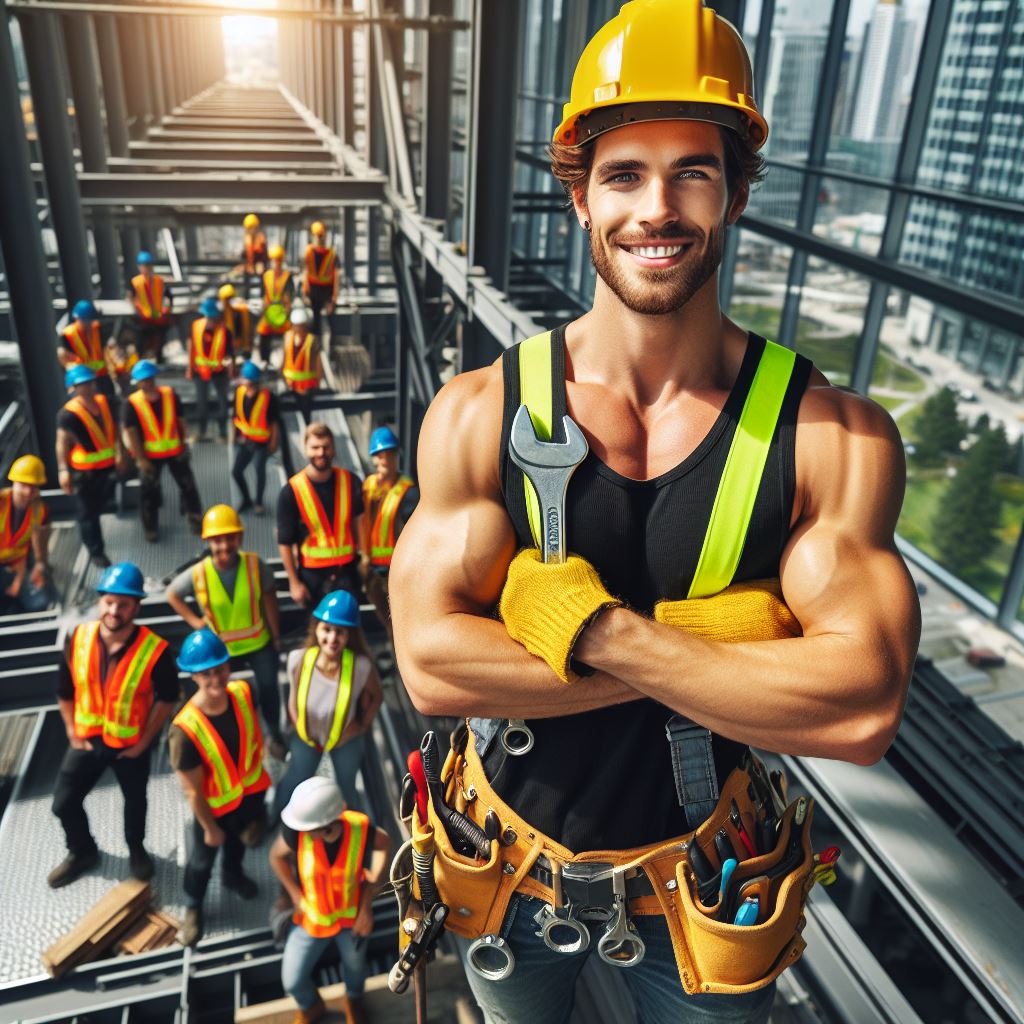Introduction
The presence of women in traditionally male-dominated industries is increasing rapidly. The construction industry is experiencing a shift in its landscape.
Today, we will explore the topic of women in construction and how they are changing the game.
In an industry historically dominated by men, the paradigm of construction is undergoing a transformative shift with the increasing presence and influence of women.
“Women in Construction: Changing the Game” not only reflects a changing workforce but also highlights the invaluable contributions, resilience, and trailblazing spirit of women in shaping the present and future of the construction sector.
This exploration delves into the challenges faced by women in construction, their triumphs in overcoming gender biases, and the dynamic impact they have on projects.
From challenging stereotypes to inspiring a new era of inclusivity and innovation, these women are not merely breaking barriers but also reshaping the narrative of what it means to be a professional in the construction field.
Their stories resonate as testaments to determination, skill, and the power of diversity in driving positive change within an industry that is evolving to embrace the talents of all its stakeholders.
Join us in unraveling the compelling narrative of women who are not just participants but essential catalysts in the evolution of construction practices and perspectives.
Statistics and current trends
In recent years, there has been a significant increase in the number of women working in construction.
According to data, the percentage of women in the construction industry has risen steadily over the past decade.
Currently, women make up around 9% of the construction workforce in the United States.
This represents a significant increase compared to previous years, where the percentage was much lower.
In 2003, for example, women accounted for only 2.4% of the construction workforce.
The rise in the percentage of women in construction can be attributed to various factors.
One of the main reasons is the increasing recognition of women’s abilities and skills in the industry.
As gender equality becomes more emphasized, women are being given equal opportunities in construction.
Furthermore, the demand for skilled workers in the construction industry has also contributed to the rise in female representation.
There is a growing need for diverse perspectives and talents to meet the challenges of the modern construction industry.
Current industry trends
The construction industry has been actively promoting initiatives to encourage women to join the field.
Many companies have implemented diversity and inclusion programs to attract and retain female talent.
These programs aim to provide support, mentorship, and career development opportunities specifically for women.
Various organizations and associations have also emerged to advocate for women in construction.
They provide resources, networking opportunities, and scholarship programs for women pursuing careers in the industry.
Scholarships and outreach programs are helping to break down barriers for women in male-dominated professions.
Industry leaders and influencers are increasingly emphasizing gender diversity as a key driver of innovation and success in construction.
Unlock Your Career Potential
Visualize a clear path to success with our tailored Career Consulting service. Personalized insights in just 1-3 days.
Get StartedBy highlighting successful women in construction, they inspire others to pursue careers in the field.
Moreover, the shift towards more sustainable and eco-friendly construction practices has also attracted more women to the industry.
Women are drawn to the opportunity to contribute to projects that promote environmental stewardship and social responsibility.
In short, the number of women working in construction has been steadily increasing over the years.
This rise can be attributed to the recognition of women’s abilities, the demand for skilled workers, and industry initiatives.
Current trends, such as diversity programs and sustainable construction practices, further encourage women to pursue careers in construction.
As the industry continues to evolve, it is crucial to foster an inclusive environment that values and supports women in construction.
Read: The Future of Construction Jobs in Canada
Challenges Faced by Women in Construction
Women in construction face numerous challenges that hinder their progress in the industry.
Societal Stereotypes and Biases
- Societal stereotypes perceive construction as a male-dominated profession, discouraging women from pursuing it.
- Biases against women in construction lead to unequal opportunities, lower wages, and limited career growth.
- Women often face skepticism about their abilities, leading to a lack of trust and respect on job sites.
- These stereotypes and biases create a hostile work environment and hinder women’s professional development.
Physical Demands and Potential Barriers
- The physically demanding nature of construction work presents challenges for women.
- Heavy lifting, prolonged standing, and exposure to hazardous materials can result in health issues.
- Safety gear and equipment may not always be designed to fit women properly, making work more difficult.
- The physical nature of the job can deter women from choosing a career in construction.
Lack of Representation and Opportunities for Advancement
- Women are significantly underrepresented in the construction industry, leading to a lack of role models.
- The absence of diverse perspectives in decision-making processes limits innovation and inclusivity.
- Opportunities for career advancement are often biased towards men, impeding women’s professional growth.
- Glass ceilings and limited access to higher-level positions restrict women’s ability to reach leadership roles.
Addressing these challenges is crucial to creating a more diverse and inclusive construction industry.
How to Overcome These Challenges
Despite the obstacles they face, women can take steps to overcome the challenges in the construction field.
Breaking Stereotypes and Biases
- Highlighting the achievements and success stories of women in construction challenges existing stereotypes.
- Educating the public about the capabilities of women in the industry helps to combat biases.
- Advocacy and support from industry leaders can create opportunities for women to prove their skills.
Creating Inclusive Work Environments
- Implementing anti-discrimination policies and promoting a culture of respect and equality fosters inclusivity.
- Providing training on unconscious bias raises awareness and promotes fair treatment of all employees.
- Encouraging mentorship programs and networking opportunities helps women connect and learn from others.
Improving Support and Representation
- Establishing support networks, such as women in construction associations, provides a sense of community.
- Encouraging companies to create diverse recruitment strategies helps increase representation.
- Offering professional development programs and leadership training assists women in advancing their careers.
By addressing these challenges head-on and implementing solutions, the construction industry can become more inclusive and diverse for women.
It is essential to prioritize equal opportunities, fair treatment, and advancement for women in construction.
Only by challenging societal norms and offering support can we truly change the game for women in the industry.
Read: 2024 Trends in the Electrical Industry in Canada
Success stories and inspiring examples
Success stories and inspiring examples
- Amanda Thompson, a civil engineer, successfully managed a major infrastructure project, receiving accolades for her leadership.
- Samantha Reynolds, a construction manager, established her own company and completed several high-profile projects.
- Dr. Elizabeth Foster, an architect, designed sustainable buildings that received international recognition for their innovative approach.
Organizations and initiatives supporting women in the industry
- Women in Construction (WIC) is a nonprofit organization that provides networking and mentorship opportunities for women in the field.
- The National Association of Women in Construction (NAWIC) advocates for equal opportunities and promotes professional development.
- Construction Industry Women (CIW) offers training programs and scholarships to encourage women to pursue careers in construction.
Stories of overcoming challenges and making a significant impact
- Emily Rodriguez faced discrimination as the only female construction worker on her team but persisted, becoming a respected forewoman.
- Sarah Johnson started as an apprentice carpenter and worked her way up to project manager, shattering gender stereotypes.
- Maria Lopez, a construction laborer, faced language barriers but became an influential advocate for inclusivity and diversity in the industry.
These success stories and initiatives are just a glimpse into the growing presence and influence of women in construction.
While historically male-dominated, the industry is evolving, recognizing the immense talent and contributions of women.
Success stories and inspiring examples
Women like Amanda Thompson, Samantha Reynolds, and Dr. Elizabeth Foster are breaking barriers and reshaping the construction landscape.
Their achievements not only inspire other women but also challenge the status quo.
Organizations and initiatives supporting women in the industry
Organizations such as Women in Construction (WIC), the National Association of Women in Construction (NAWIC), and Construction Industry Women (CIW) provide vital support networks for women in the industry.
Through mentorship programs, networking events, and advocacy, they empower women to succeed in a traditionally male-centric environment.
Stories of overcoming challenges and making a significant impact
But success doesn’t come without challenges. Emily Rodriguez faced discrimination and stereotypes, yet her determination propelled her to become a respected forewoman.
Sarah Johnson defied norms by climbing the ladder from apprentice carpenter to project manager, proving that skill and dedication know no gender.
Maria Lopez, despite language barriers, raised awareness about the importance of diversity and inclusivity in construction.
These stories showcase the resilience and impact of women in the industry, serving as beacons of hope for aspiring female professionals.
They demonstrate that gender should never limit one’s ambition or potential.
As the construction industry begins to value diversity, it opens doors for innovation, creativity, and fresh perspectives.
Companies that embrace gender equality are more likely to thrive, benefiting from the diverse expertise and problem-solving skills that women bring to the table.
In fact, women in construction are changing the game, challenging stereotypes, and making significant contributions to the industry.
Their success stories inspire others to break barriers, and organizations and initiatives offer crucial support along the way.
As we continue to empower and uplift women in construction, we build a stronger, more inclusive future for the industry as a whole.
Read: Earning Potential for Builders in Canada

Benefits of Gender Diversity in Construction
The advantages of having more women in the construction workforce
Gender diversity in the construction industry has numerous advantages that contribute to a more inclusive, innovative, and successful workforce.
Here are some key benefits:
Enhanced Skill Set
- Women bring unique perspectives, experiences, and skills to the industry, broadening the overall talent pool.
- Their diverse backgrounds and expertise foster creativity, problem-solving, and the ability to think outside the box.
- Women often possess strong communication and collaboration skills, promoting smooth teamwork and effective project management.
Improved Workforce Performance
- Having a gender-diverse workforce can significantly enhance productivity and efficiency.
- Studies have shown that diverse teams tend to be more motivated, resulting in better decision-making and problem-solving processes.
- With different perspectives and approaches, teams can anticipate and address challenges more comprehensively.
- Women’s attention to detail and adherence to safety regulations contribute to a safer work environment.
Increased Innovation
- Gender diversity encourages a broader range of ideas, leading to increased creativity and innovation.
- Women bring fresh solutions, different approaches, and alternative viewpoints to construction projects.
- Collaboration between male and female professionals can result in groundbreaking solutions and improved project outcomes.
- Research has shown that gender-diverse teams are more likely to develop innovative products and services.
Enhanced Reputation
- Companies that promote gender diversity in their construction workforce are perceived as more progressive, inclusive, and socially responsible.
- By fostering a supportive environment for women, companies can attract top talent and gain a competitive edge.
- A diverse workforce also helps companies better understand and meet the needs of a diverse client base.
Positive Cultural Shift
- Increasing the representation of women in this sector can help break gender stereotypes and facilitate equality.
- By promoting diverse role models, the industry becomes more attractive and accessible to future generations.
- Greater gender diversity can alleviate the labor shortage in construction by tapping into an underutilized talent pool.
- Gender-balanced teams foster a more inclusive and harmonious work culture, benefiting employees at all levels.
In essence, gender diversity in the construction industry brings significant benefits to both companies and individuals.
Embracing the unique perspectives and skills that women bring not only improves overall performance and innovation but also leads to a more inclusive and satisfying work environment.
By actively promoting and supporting gender diversity, construction companies can thrive in an ever-evolving industry and contribute to a more equitable future.
Read: How to Start a Career in Construction
Promoting and Supporting Women in Construction
Creating an Inclusive and Supportive Work Environment
- Embracing diversity and gender equality in the construction industry is essential for progress.
- Companies should actively work towards eliminating gender biases and stereotypes within their organizations.
- Offering equal pay and benefits for women in this sector is crucial to fostering an inclusive work environment.
- Providing training and development opportunities for women can help them thrive in their careers.
- Encouraging collaboration and teamwork among all employees regardless of gender promotes a supportive workplace culture.
- Recognizing and rewarding the achievements of women in construction can inspire others and boost morale.
- Implementing flexible work arrangements can accommodate the needs of women in construction who also have caregiving responsibilities.
- Investing in proper safety equipment and infrastructure that caters to the needs of women can make them feel valued and respected.
Mentorship Programs and Professional Networks
- Mentorship programs play a vital role in nurturing the careers of women in construction.
- Experienced professionals can provide guidance, support, and valuable insights to women entering the field.
- Creating mentorship opportunities within organizations allows for the transfer of knowledge and expertise.
- Professional networks tailored for women in construction offer a platform for sharing experiences and resources.
- These networks can provide access to job opportunities, training programs, and industry-related events.
- Building connections through networking can help women overcome challenges and advance their careers.
- Mentors can empower women by helping them build confidence, navigate career obstacles, and set achievable goals.
- Engaging male allies as mentors and advocates for gender diversity in construction reinforces the importance of inclusivity.
Promoting Gender Diversity
- Companies should establish clear diversity and inclusion policies that explicitly address gender equality.
- Creating a diverse hiring committee can ensure that biases are minimized during the recruitment process.
- Prioritizing gender diversity in leadership positions helps break down barriers and inspires future generations.
- Conducting regular diversity and inclusion training programs can raise awareness and sensitivity among employees.
- Collaborating with educational institutions and vocational programs can encourage more women to pursue careers in this sector.
- Celebrating the accomplishments of women in construction through awards and recognition can inspire others to join the industry.
- Encouraging men to actively support and mentor women helps create a more inclusive work environment.
- Sharing success stories of women through various mediums highlights their contributions and challenges societal stereotypes.
In general, promoting and supporting women is crucial for creating a more inclusive and diverse industry.
By creating an inclusive work environment, establishing mentorship programs and professional networks, and actively promoting gender diversity, companies and organizations can help change the game for women in the industry.
Conclusion
The importance of women in construction cannot be overstated.
The industry is undergoing significant changes, with more and more women breaking barriers and making their mark.
It is crucial to acknowledge and promote gender equality and diversity within the sector.
While progress has been made, there is still much work to be done.
Encouraging further advancement and support for women in construction is necessary for continued growth and success.
By embracing diversity, the industry can benefit from fresh perspectives and innovative ideas.
It is essential for all stakeholders to recognize and appreciate the contributions that women have made and continue to make in construction.
Their skills, knowledge, and dedication are invaluable assets that should be celebrated and acknowledged.
The game is changing, and women in construction are playing a significant role.
Let us push for continued progress in promoting gender equality, diversity, and inclusivity.
We must support and recognize the contributions women are making in the construction industry and create an environment where they can thrive.
Together, we can redefine the future of construction and build a more equal and inclusive sector for all.




